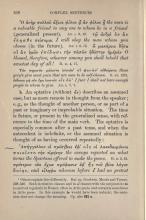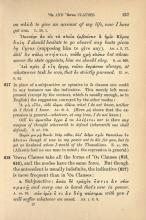612. The Relative Pronoun ὅς (§ 213) connects its clause with some noun or pronoun, and has its own construction in the subordinate clause. (So of its compounds ὅσπερ, ὅστις, etc.)
a. The connecting force of ὅς may be no stronger than that of a demonstrative. The ὅς clause is then really independent.
When clearly subordinate, the ὅς clause often precedes the leading clause, or may be included within it.
613. a. The Relative Pronouns take their gender, number, and person from the antecedent; but sense may prevail over form, and when the relative is the subject a predicate noun sometimes prevails over the antecedent.
b. The Relative is often attracted from its proper case to the case of the antecedent, especially from the accusative to the genitive or dative.
Ἄνδρες ἄξιοι τῆς ἐλευθερίᾱς ἧς κέκτησθε
men worthy of the freedom which you possess
Xen. Anabasis 1.7.3
φοβοίμην ἂν τῷ ἡγεμόνι ᾧ δοίη ἕπεσθαι
I should fear to follow the guide whom he may give.
Xen. Anabasis 1.3.17
c. Rarely the antecedent is attracted to the case of the relative, the two standing side by side.
Ἀνεῖλεν αὐτῷ ὁ Ἀπόλλων θεοῖς οἷς ἔδει θῡ́ειν.
Apollo in response told him the gods to whom he should sacrifice.
Xen. Anabasis 3.1.6
d. The antecedent may be taken up into the subordinate clause, ὅς agreeing with it adjectively.
Tούτους ἄρχοντας ἐποίει ἦς κατεστρέφετο χώρᾱς.
These he made rulers of the territory which (of what territory) he subdued.
Xen. Anabasis 1.9.14
614. The antecedent may be omitted; it is often indefinite and therefore not expressed; it may none the less attract the relative from the accusative to the genitive or dative (§ 613.b, above):
Nῦν ἐπαινῶ σε ἐφʼ οἷς λέγεις τε καὶ πρᾱ́ττεις.
Now I praise you for what you both say and do.
Xen. Anabasis 3.1.45
ἅ μὴ οἶδα οὐδὲ οἴομαι εἰδέναι.
What I do not know, I also do not think I know.
Plato Apology 21d
ἐμμένομεν οἷς ὡμολογήσαμεν δικαίοις οὖσιν ἢ οὔ;
Do we abide by what we agreed was just, or not?
Plato Crito 50a
a. From the customary omission of the antecedent have arisen some common idiomatic expressions.
|
εἰσὶν οἵ (more often) ἔστιν οἵ (ὧν, οἷς, οὕs, ἅ) |
some literally there are who, etc. |
| ἔστιν ὅστις; (interrogative) |
is there any one who? |
| ἐνίοτε (from ἔνι ὅτε) | sometimes |
| ἔστιν οὗ | somewhere |
| ἔστιν ᾗ | in some way |
| οὐκ ἔστιν ὅπως | there is no way how |
b. With these may be put οὐδεὶς ὅστις οὐ (there is no one whο . . . not); through omission of the verb and the attraction of the antecedent to the case of the relative (§ 613.c, above), the phrase is treated as a single pronoun meaning every one, and is then declined.
Oὐδἐνα ὅντινʼ οὐ κατέκλασε.
He broke down every one.
Plato Phaedo 117d
615. A Ὅς Clause may take any form that is used in simple sentences (§§ 451 – 489). It may suggest cause, purpose, concession, and other relations. The negative is οὐ or μή according to the meaning.
Tοιούτους ἐπιπέμπουσί μοι, οἷς ῡ̔μεῖς οὐκ ἂν δικαίως πιστεύοιτε.
They send against me such people, whom you would not justly believe.
Lysias 7.40
ὃ μὴ γένοιτο
which heaven forbid (may which not happen!)
ἔδοξε τῷ δήμῳ τριᾱ́κοντα ἄνδρας ἑλέσθαι, οἵ τοὺς πατρίους νόμους συγγράψουσι, καθʼ οὕς πολῑτεύσουσι.
the people voted to choose thirty men to codify the ancestral laws, in accordance with which they should conduct the government.
Xen. Hellenica 2.3.2
ποταμόν, ὃν μὴ περσῃς
a river, which do not thou pass
Aesch. Prometheus Bound 717–718
πλάνην φράσω, ἥν ἐγγράφου σὺ μνήμοσιν δέλτοις φρενῶν.
I will tell thy wandering, which do thou write in the tablets of thy memory.
Aesch. Prometheus Bound 788–789
a. Instead of repeating a relative in a different case in the same sentence, Greek usually changes to a demonstrative or relative pronoun, or leaves the relative to be supplied.
Ξενοφῶν, ὃς οὔτε στρατηγὸς οὔτε στρατιώτης ὤν συνηκολούθει, ἀλλὰ Πρόξενος αὐτὸν μετεπέμψατο.
Xenophon, who was with them neither as general nor as soldier, but Proxenos had sent for him.
Xen. Anabasis 3.1.4
616. In Ὅς Clauses that differ in form from simple sentences
a. A subjunctive (with ἄν, which is sometimes omitted in poetry, rarely in prose) describes a supposed or assumed case, which may or may not be real. The time is future, or present in the generalized sense (i. e, applying to present, past, and future alike). The subjunctive is especially common when the antecedent is indefinite.
Ὁ ἀνὴρ πολλοῦ ἄξιος φίλος ᾧ ἂν φίλος ᾖ.
The man is a valuable friend to any one to whom he is a friend. (generalized present)
Xen. Anabasis 1.3.12
τῷ ἀνδρὶ ὃν ἂν ἕλησθε πείσομαι.
I will obey the man whom you choose. (in the future)
Xen. Anabasis 1.3.15
ὦ μακάριοι δῆτα οἵ ἂν ῡ̔μῶν ἐπίδωσι τὴν πᾱσῶν ἡδίστην ἡμέρᾱν.
O blessed, therefore, whoever among you shall behold that sweetest day of all!
Xen. Hellenica 2.4.17
Tῶν πημονῶν μάλιστα λῡποῦσʼ αἵ φανῶσʼ αὐθαίρετοι.
Those griefs give most pain that are seen to be self-chosen.
Soph. Oedipus the King 1230–1231
δέδοικα μὴ οὐκ ἔχω ἱκανοὺς οἷς δῶ.
I fear I shall not have enough people to whom to give.
Xen. Anabasis 1.7.7[fn]Others explain this differently. But cp. Goodwin, Moods and Tenses, §§ 538 – 540. Both in relative clauses and in εἰ clauses with the subjunctive ἄν is omitted reguularly in Homer, often in Attic poets, and certainly sometimes in Attic prose. In this example ἄν would have been natural; the omission does not change the meaning. Cp. also § 621.a.[/fn]
b. An optative (without ἄν) describes an assumed case, but as more remote in thought from the speaker; e.g., as the thought of another person, or as part of a past or imaginary or improbable situation. The time is future, or present in the generalized sense, with reference to the time of the main verb. The optative is especially common after a past tense, and when the antecedent is indefinite, or the assumed situation is thought of as having occurred repeatedly.
Ἀπήγγελλον οἱ πρέσβεις ἐφʼ οἷς οἱ Λακεδαιμόνιοι ποιοῖντο τὴν εἰρήνην.
The envoys reported on what terms the Spartans offered to make the peace.
Xen. Hellenica 2.2.22
πρότερον οὐκ ἔχων πρόφασιν ἐφʼ ἧς τοῦ βίου λόγον δοίην, νῡν εἴληφα.
Whereas before I had no pretext on which to give an account of my life, now I have got one.
Lysias 24.1
Ὀκνοίην ἂν εἰς τὰ πλοῖα ἐμβαίνειν ἅ ἡμῖν Κῦρος δοίη.
I should hesitate to go aboard any boats given by Cyrus (supposing him to give any).
Xen. Anabasis 1.3.17
ἀλλʼ ὅν πόλις στήσειε, τοῦδε χρὴ κλύειν.
But whomsoever the state appoints, him we should obey.
Soph. Antigone 666
Ἀεὶ πρὸς ᾧ εἴη ἔργῳ, τοῦτο ἔπρᾱττεν.
Always, at whatsoever task he was, that he strictly pursued.
Xen. Hellenica 4.8.22
617. In place of a subjunctive or optative in ὅς clauses one could in any instance use the indicative. This merely left unexpressed (except by the context, which is usually enough, as in English) the suggestion conveyed by the other modes.
Ἅ μὴ οἶδα, οὐδὲ οἴομαι εἰδέναι.
What I do not know, neither do I think I know.
Plato Apology 21d
(Here μή shows that the expression is general— whatever, at any time, I do not know.)
Oὐδʼ ἔνι φροντίδος ἔγχος ᾧ τις ἀλέξεται.
Nor is there any weapon of thought wherewith to defend (wherewith one shall defend).
Soph. Oedipus the King 170–171
Παρόν μοι μὴ θανεῖν ὑπὲρ σέθεν, ἀλλʼ ἄνδρα σχεῖν Θεσσάλων ὃν ἤθελον
though it was in my power not to die for you, but to get as husband whom I would of the Thessalians. (Alkestis had no one man in mind; the expression is general.)
Eur. Alcestis 284–285
618. Ὅστις Clauses take all the forms of Ὅς Clauses (§§ 615 and 616, above), and the modes have the same force. But though the antecedent is usually indefinite, the indicative (§ 617, above) is more frequent than in Ὅς Clauses.
a. Subjunctive:
ἅπᾱς δὲ τρᾱχὺς ὅστις ἂν νέον κρατῇ
and every one is harsh that's new in power
Aesch. Prometheus Bound 35
σὺν ῡ̔μῖν ὅ τι ἂν δεῄ πείσομαι.
With you I will suffer whatever we must.
Xen. Anabasis 1.3.5
Without ἄν:
καλόν τοι γλῶσσʼ ὅτῳ πιστὴ παρῇ.
It is a fine thing, whoever has a trusty tongue.
Eur. Iphigenia in Tauris 1064
b. Optative:
οὕστινας χρείη ἄρχειν παρήγγελλον.
They gave orders what men should hold office.
Lysias 12.44
αἰσχρὸν ῡ̔μῖν καὶ ἡντινοῦν δίκην ἀπολιπεῖν ἥντινά τις βούλοιτο παρὰ τούτων λαμβάνειν.
It is shameful for you that any (penalty) whatever should be lacking which any one might wish to exact from these men.
Lysias 12.84.
(Here the optative heightens to the utmost the inclusiveness of the expression— the most unlikely wish could not go too far.)
c. Indicative where subjunctive or optative would have been appropriate.
Ὅστις ζῆν ἐπιθῡμεῖ, πειρᾱ́σθω νῑκᾶν.
Whoever is eager to live, let him try to conquer.
Xen. Anabasis 3.2.39
παρέσχον ἐμαυτὸν ὅ τι βούλεσθε χρῆσθαι.
I offered myself for you to treat in whatever way you will.
Lysias 7.40
619. Ὅστις with an indicative often suggests cause, purpose, or result, by treating a definite antecedent as indefinite in order to characterise it (generally of persons).
Τί τὸν θεοῖς ἔχθιστον οὐ στυγεῖς θεόν, ὅστις τὸ σὸν θηντοῖσι προύδωκεν γέρας;
Why dost thou not hate this god, to gods most hateful, one who betrayed thy prize to men?
Aesch. Prometheus Bound 38
Πρεσβείᾱν πέμπειν ἥτις ταῦτʼ ἐρεῖ
to send an embassy to say this
Demosthenes 1.2
Tίς οὕτω μαίνεται ὅστις οὐ βούλεταί σοι φίλος εἶναι;
Who is so mad as not to wish to be your friend?
Xen. Anabasis 2.5.12






